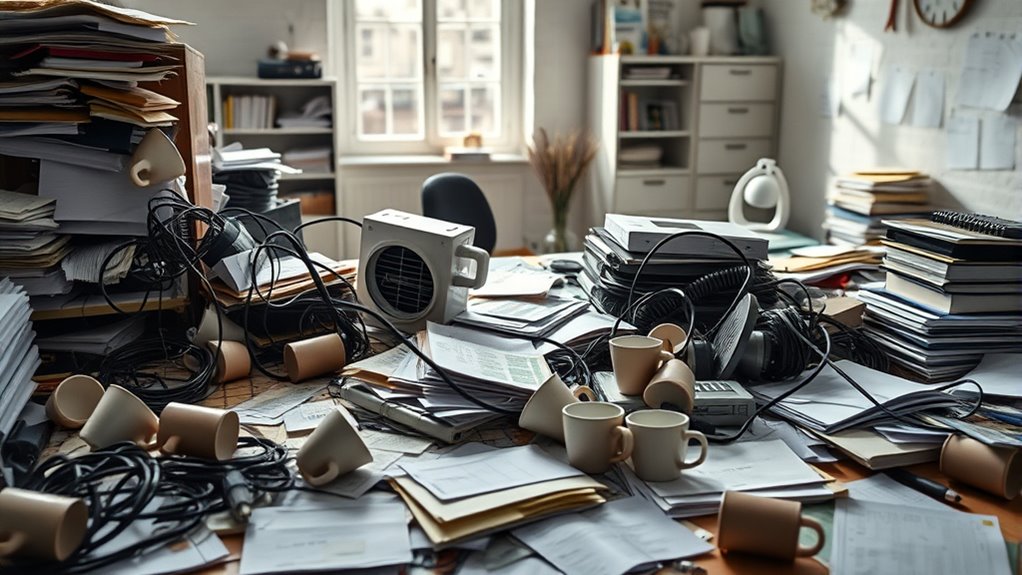Clutter overloads your brain, making it harder to focus, process information, and think clearly. It creates visual chaos that drains mental resources, heightening stress and reducing relaxation. Living in mess can trigger feelings of guilt and helplessness, impacting your emotional health. The risks go beyond mental tolls—clutter can cause accidents and worsen allergies. To regain clarity and calm, you need simple, effective strategies; discover how to start clearing the chaos today.
Key Takeaways
- Clutter competes for brain resources, impairing focus, reducing mental clarity, and increasing cognitive overload.
- Visual chaos from clutter hampers memory, slows decision-making, and makes filtering relevant information difficult.
- Disorganized environments trigger stress and anxiety, decreasing relaxation and emotional wellbeing.
- Clutter elevates cortisol levels, contributing to mental health issues like depression and feelings of helplessness.
- Regular decluttering restores mental clarity, improves focus, and reduces stress by minimizing visual distractions.
The Connection Between Clutter and Cognitive Overload
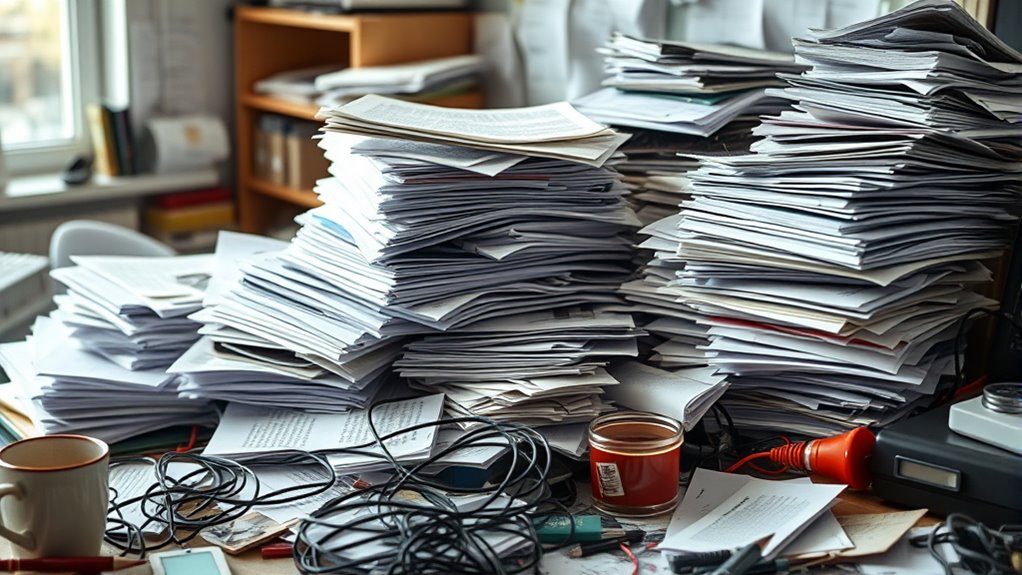
Clutter directly impacts your ability to focus by competing for your brain’s limited resources. When your environment is cluttered, your brain experiences cognitive overload, making it harder to concentrate. Visual reminders of disorganization drain mental capacity, reducing mental clarity and impairing decision-making. Princeton’s 2011 study shows that clutter overloads the brain, decreasing your focus and processing speed. Excess objects create constant visual stimuli that overload your working memory and short-term information retention. This overload hampers your mental health by increasing irritability and reducing mental performance. When clutter fills your space, your brain struggles to filter out distractions, leading to feelings of overwhelm. Clearing clutter, on the other hand, allows your brain to process information more efficiently and enhances focus. Additionally, understanding the effects of mental clutter can motivate you to organize your environment for better cognitive health. Incorporating effective vacuuming techniques can help you maintain a clutter-free space, supporting mental well-being and overall clarity. Regularly decluttering your environment can also reduce the buildup of distractions, allowing your mind to stay more focused and less overwhelmed. Addressing clutter promptly can prevent the accumulation of mental overload, which further hampers your ability to think clearly and make decisions.
How Clutter Elevates Stress and Impacts Mental Wellbeing
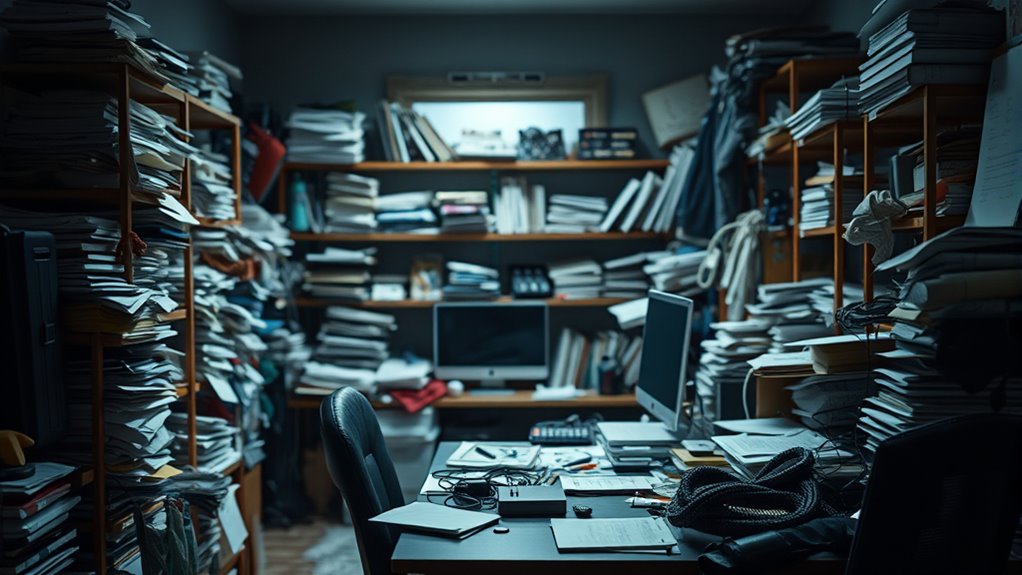
When your environment is cluttered, your body reacts by increasing stress levels, often without you realizing it. Clutter triggers the release of stress hormones like cortisol, especially in women, heightening feelings of anxiety. Visual reminders of disorganization drain your cognitive resources, leaving you overwhelmed and mentally fatigued. Living amid clutter activates a low-grade fight or flight response, taxing your body’s survival mechanisms. This constant state of alertness reduces your ability to focus and process information clearly. Over time, persistent clutter impairs your mental wellbeing by elevating stress and creating a cycle of disorganization. Regularly maintaining your space through appliance maintenance plans can help reduce these stress hormones, restore focus, and improve your overall mental health, supporting a calmer, more organized mind. Additionally, adopting clutter management strategies can further decrease the mental load associated with disorganization, fostering greater peace of mind and encouraging mindful organization practices to enhance mental clarity. Incorporating environmental cues into your space can also serve as reminders to maintain order and reduce the buildup of clutter, further alleviating stress levels.
The Effects of Disorganization on Focus and Memory

Disorganization hampers your ability to concentrate and remember information effectively. Clutter creates visual chaos that drains cognitive resources, leading to cognitive overload and reducing your focus. When your environment is disorganized, your brain struggles to filter relevant data, decreasing mental clarity and making it harder to process tasks. This overload hampers memory retention and slows decision-making. Clearing clutter has been shown through fMRI studies to improve focus and information processing, helping you think more clearly. To visualize this, consider the impact:
| Clutter | Focus | Memory |
|---|---|---|
| Visual chaos | Cognitive overload | Reduced retention |
| Mental fatigue | Impaired decision-making | Distraction |
| Disorganization | Decreased mental clarity | Less effective recall |
Implementing spatial arrangement strategies based on interior design principles can guide effective clutter management to optimize mental clarity. Utilizing furniture placement techniques can further reduce visual noise and streamline your environment. Reducing clutter restores mental clarity and enhances focus and memory, which is especially important for maintaining cognitive resources over time.
Physical Health Risks Linked to Cluttered Environments
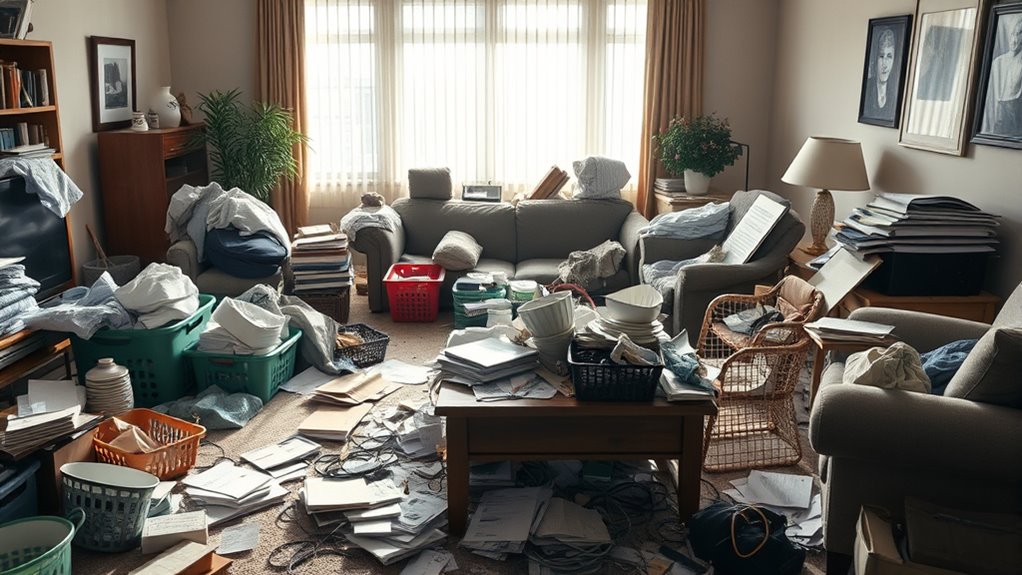
Cluttered spaces can be dangerous because they increase the risk of slips, trips, and falls, especially for seniors. Overloaded shelves and unstable furniture may topple and cause injuries, while dust buildup worsens allergies and respiratory problems. These hazards also raise fire risks and make cleaning more difficult, compromising your overall safety. Additionally, trust issues with your environment can develop when clutter obscures clear pathways and creates chaos, further impacting your mental well-being. Regular cleaning and organization can help reduce filtration system buildup and improve overall safety. Incorporating tuning modifications such as better storage solutions can also help keep clutter under control and enhance the safety of your space. Moreover, understanding how electric bikes and related equipment function can help you handle potential safety concerns associated with modern technology in cluttered environments. Maintaining awareness of symptoms of breast cancer can encourage early detection and prompt medical consultation if any concerning signs arise.
Fall Hazards Increase
Cluttered environments substantially raise the risk of slips, trips, and falls by blocking pathways and overloading surfaces. When clutter increases fall hazards, it becomes difficult to navigate safely, especially around obstructed pathways and overloaded surfaces. Unstable furniture, like wobbly shelves or toppled stacks, adds to the danger by creating safety hazards that can lead to injuries. These hazards are particularly risky for the elderly or those with mobility issues. Clutter also makes it harder to see potential obstacles and increases the chance of tripping. By cluttering your space, you unintentionally heighten the fall risk, putting yourself at greater physical danger. Regularly clearing clutter can restore safe movement and reduce the likelihood of accidents. Additionally, maintaining a tidy environment can improve overall visual clarity and help you identify hazards more easily. Incorporating appropriate home furnishings, such as secure storage solutions, can further reduce clutter and enhance safety. Moreover, organizing your belongings thoughtfully can boost mental clarity and promote a calmer, more focused environment.
Allergy Risks Rise
When clutter piles up, it creates more than just a visual mess; it also traps dust, mold, and pet dander that can worsen allergy symptoms and respiratory issues. Cluttered spaces promote allergen buildup because excess papers, fabrics, and knickknacks make cleaning difficult, allowing dust accumulation to persist. This ongoing dust buildup can exacerbate allergy symptoms and trigger asthma flare-ups, especially if you’re sensitive. The difficulty in thoroughly cleaning cluttered areas means allergens remain present, increasing your risk of chronic respiratory problems over time. Not only does clutter hinder effective cleaning, but it also creates an environment where airborne irritants thrive, making allergies and respiratory issues more severe. Keeping your space organized reduces allergen buildup and supports better respiratory health.
Fire Safety Compromised
Have you considered how clutter can directly threaten your safety? In a cluttered home environment, hazards like blocked exits and narrow pathways hinder quick evacuation during a fire emergency. Overloaded shelves and unstable furniture are more likely to topple, causing injuries or igniting fires if they fall onto heat sources. Accumulated dust and debris on cluttered surfaces increase the risk of respiratory fires or flames igniting from sparks. Piles of papers and flammable objects stored haphazardly can cause fires to spread rapidly. Additionally, clutter makes cleaning difficult, allowing dust and flammable materials to build up, which heightens fire risks. Keeping your space organized isn’t just about tidiness—it’s essential for maintaining fire safety and preventing dangerous injuries.
Emotional Consequences of Living in a Messy Space

Living in a messy space can take a toll on your emotional well-being, often triggering feelings of guilt, shame, and embarrassment. A cluttered home can increase stress levels, making it harder to relax and enjoy your environment. The disorganization may contribute to heightened cortisol, which impacts your mental health and fuels anxiety and depression. When your space feels overwhelming, it’s easy to get stuck in a cycle of helplessness, reducing your motivation to tackle clutter. This persistent chaos can also impair emotional communication, affecting your social interactions. On the flip side, decluttering helps reduce stress, boosts feelings of control, and enhances your emotional wellbeing. Clearing your space creates a sense of accomplishment, helping you feel more balanced and in tune with your mental health.
Strategies to Effectively Declutter and Maintain Order

Start by tackling small areas like a drawer or shelf to make decluttering feel less overwhelming. Set a timer for quick sessions to stay focused and avoid burnout, and create routines like sorting mail immediately to keep clutter at bay. Enlisting support from others can also keep you motivated and accountable as you work to maintain order.
Small Steps First
Tackling clutter can feel overwhelming, but focusing on small areas makes the decluttering process more manageable. Starting with small steps, like a single drawer or shelf, helps you avoid feeling overwhelmed and keeps the task quick and achievable. Setting a timer for just five minutes can make each session feel doable and prevent burnout. Categorizing items into keep, trash, and maybe piles streamlines decisions and reduces emotional overload. Regularly scheduling short, consistent decluttering sessions helps build habits that support organized living. Celebrating these small successes boosts your motivation and confidence, making it easier to tackle larger projects over time. Remember, small steps lead to lasting change, making the journey toward a clutter-free space more sustainable and less stressful.
Establish Daily Routines
Establishing daily routines is key to maintaining an organized space and preventing clutter from accumulating again. Consistent daily routines, like the “touch once” habit, encourage you to declutter immediately, keeping your environment organized. Creating specific schedules for tasks such as sorting mail or tidying up ensures regular maintenance, reducing visual chaos. Using checklists for morning and evening resets promotes ongoing decluttering and helps prevent mental overload caused by clutter. Supporting these routines with designated storage spaces and labels makes organization more efficient and decreases the chances of clutter reaccumulating. Regularly reviewing and tidying your space, even in small steps, sustains the mental health benefits of order, helping to reduce stress and foster a calmer, more focused mind.
Simple Steps to Reclaim Your Space and Mind
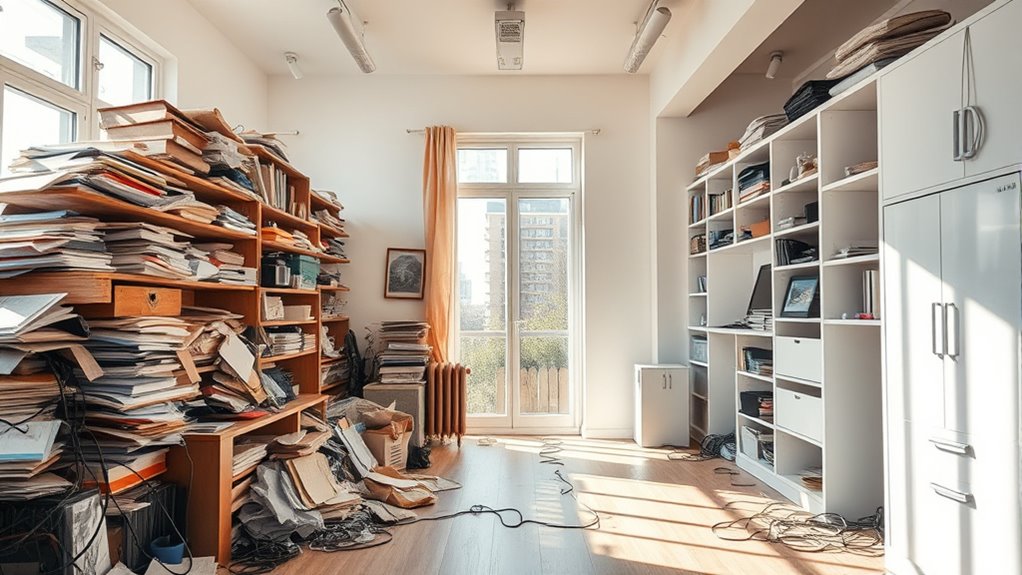
To effectively reclaim your space and clear your mind, focus on one small area at a time. Tackling cluttered homes can feel overwhelming, but breaking it down makes decluttering manageable. Start with a drawer or shelf, and set a timer for five minutes to create urgency and stay focused. Use three boxes labeled keep, donate, and discard to sort items quickly, helping you process information efficiently. Incorporate regular, short decluttering sessions into your routine—weekly, if possible—to build sustainable organization habits. Celebrate small victories along the way to stay motivated and reinforce your progress. These small steps boost mental clarity by reducing visual chaos, making it easier to focus and think clearly in your space and mind.
Frequently Asked Questions
What Is the Root Cause of Clutter?
The root cause of clutter often lies in emotional attachment to your possessions. You might keep items as a way to cope with feelings like anxiety, sadness, or past trauma. This attachment can stem from unresolved grief or childhood experiences, giving you a sense of control or comfort. Recognizing these emotional reasons helps you understand why clutter accumulates and makes it easier to address the underlying issues.
How Do I Stop Being Overwhelmed by Clutter?
It’s funny how you think tackling clutter feels impossible, but starting small makes all the difference. You can’t conquer an entire room in one go, so set a timer for 5-10 minutes and focus on one tiny area. Use the categorize-and-pass method, and build a daily habit. Enlist a friend’s help or a pro to keep motivated. Before you know it, clutter won’t overwhelm you anymore.
What Does Clutter Do to the Brain?
Clutter overloads your brain, making it harder for you to focus and process information efficiently. When your environment is messy, your cognitive resources are drained, impairing decision-making and problem-solving. It also reduces your working memory, limiting your ability to hold and manipulate information. Plus, clutter triggers stress, raising cortisol levels, which further hampers mental clarity. Clearing your space can help restore focus, reduce stress, and boost overall mental performance.
What Is the Psychological Root of Clutter?
You might find clutter rooted in emotional attachments to your possessions, often serving as a coping mechanism during stressful times, grief, or feelings of loss. These items could symbolize unresolved childhood issues or traumas, making discarding them emotionally difficult. Guilt, shame, or low self-worth can reinforce your attachment, while mental health struggles like depression or anxiety may cause you to hold onto clutter as a form of emotional protection.
Conclusion
Imagine your mind as a busy highway—clutter is like endless traffic jams, slowing everything down. When you clear your space, you free your mind to move smoothly and think clearly. Studies show clutter can increase stress by up to 40%. So, take small steps today—declutter one drawer or shelf—and watch your mental clarity and calmness grow. Just like a tidy room, a clear mind makes life’s journey much easier.
